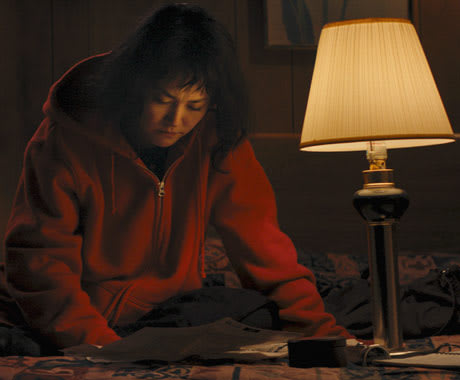In 2001, a woman named Takako Konishi was found dead in a remote area of Minnesota. Botched eyewitness information swirled into an urban legend, with media reports insinuating that Konishi had traveled to Minnesota from Japan to seek out the briefcase of money hidden by Steve Buscemi's character Carl Showalter in the movie Fargo. The truth was far sadder — Konishi had come to America to commit suicide — but the urban legend still stuck. Director/writer sibling duo David and Nathan Zellner were so fascinated and haunted by this modern fable that they made a movie about it, and Kumiko, The Treasure Hunter is the result: a cinematic fever dream exploring the nebulous and uncertain space between fact and fiction.
We are introduced to Kumiko — played with gorgeous understatement by Rinki Kikuchi (Babel, Pacific Rim) — as a woman perched on the brink of total indifference. Each day, she shuffles from her shoebox-sized Tokyo apartment to a deadening admin job as an "Office Lady" along with a host of other young women clad in matching uniforms.
Kumiko's perceived aimlessness offends and confuses everyone in her orbit, including her mother, who bemoans her inability to find a husband, and her boss, who has a far younger replacement waiting in the wings. Her only solace is her pet bunny, Bunzo, and a battered VHS tape of Fargo that she rewinds and rewatches at a key moment: Steve Buscemi, his ear gushing blood, burying a briefcase of money in a frozen landscape beside a farm fence. The grainy images are the key to Kumiko's destiny. With a cross-stitched diagram of the fence and buried treasure in tow, she heads to America, encountering a series of characters that help and hinder her progress along the way.
In the hands of another director, Kumiko's story could quickly descend into a depressing slog — or worse, become dangerously precious — but Kikuchi's performance negates this with humor and unwavering conviction. And while the story sometimes threatens to veer into Lost In Translation-esque comedy via cultural misunderstanding, we never feel like the jokes are being made at Kumiko's expense. The scene in which a helpful but misguided cop (played by Zellner) drags Kumiko to a Chinese restaurant owner in order to "translate" her problem is cringeworthy, but only because it seems all too real. Above all else, there is an ineffable and wondrous beauty to the red hoodie-clad Kumiko walking with such inexplicable determination through snow-covered hills and forests gone spectral with ice.
Is Kumiko mentally ill? Is she a criminal-in-training? Is she a ghost? It's never clarified, but it doesn't matter. This movie draws you in with the mysterious allure of a folk tale, and that is ultimately where its pleasures lie.
(Films We Like)We are introduced to Kumiko — played with gorgeous understatement by Rinki Kikuchi (Babel, Pacific Rim) — as a woman perched on the brink of total indifference. Each day, she shuffles from her shoebox-sized Tokyo apartment to a deadening admin job as an "Office Lady" along with a host of other young women clad in matching uniforms.
Kumiko's perceived aimlessness offends and confuses everyone in her orbit, including her mother, who bemoans her inability to find a husband, and her boss, who has a far younger replacement waiting in the wings. Her only solace is her pet bunny, Bunzo, and a battered VHS tape of Fargo that she rewinds and rewatches at a key moment: Steve Buscemi, his ear gushing blood, burying a briefcase of money in a frozen landscape beside a farm fence. The grainy images are the key to Kumiko's destiny. With a cross-stitched diagram of the fence and buried treasure in tow, she heads to America, encountering a series of characters that help and hinder her progress along the way.
In the hands of another director, Kumiko's story could quickly descend into a depressing slog — or worse, become dangerously precious — but Kikuchi's performance negates this with humor and unwavering conviction. And while the story sometimes threatens to veer into Lost In Translation-esque comedy via cultural misunderstanding, we never feel like the jokes are being made at Kumiko's expense. The scene in which a helpful but misguided cop (played by Zellner) drags Kumiko to a Chinese restaurant owner in order to "translate" her problem is cringeworthy, but only because it seems all too real. Above all else, there is an ineffable and wondrous beauty to the red hoodie-clad Kumiko walking with such inexplicable determination through snow-covered hills and forests gone spectral with ice.
Is Kumiko mentally ill? Is she a criminal-in-training? Is she a ghost? It's never clarified, but it doesn't matter. This movie draws you in with the mysterious allure of a folk tale, and that is ultimately where its pleasures lie.




